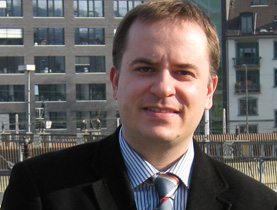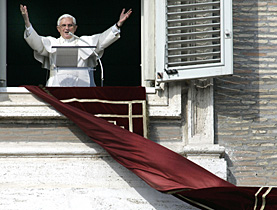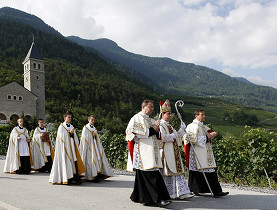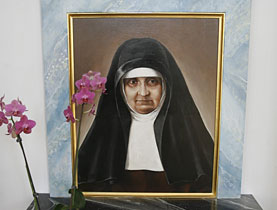Helping migrants live their faith

Bringing foreigners together, but allowing them to live their own faith, is a big challenge for the Swiss Catholic Church, says its director of migration Marco Schmid.
Integration is not always easy, Schmid tells swissinfo, which is why the church has opted for creating more than 100 foreign language parishes within the country.
These missions hold their own masses and often have their own priests. The largest ones come from southern Europe, but eastern Europe and Asia are also represented.
There are around 1.7 million foreigners in Switzerland, and 50 per cent of them are Catholics, making them an important group for the Church, says Schmid.
As head of the Swiss Bishops Conference Migratio commission, 33-year-old Schmid is in charge of coordinating pastoral care for foreigners and dealing with social and ethical migration issues. A second-generation immigrant himself, Schmid took up the post last September.
swissinfo: What does the migrant landscape look like for the Swiss Catholic Church?
Marco Schmid: We have a lot of Catholic migrants from southern Europe, Italy, Portugal and Spain. Around 50 years ago migrants were mainly people from southern Europe who came to Switzerland to work on construction sites, for example.
Today we have more intellectual migrants, managers, doctors and engineers. Also the countries are changing. Africans have been coming here for the past ten to 15 years, as have Tamils and people from Asia. But the biggest group still comes from Europe.
swissinfo: How important is it for the Church to accommodate migrants?
M.S.: What is important for the bishops is that people can find a place where they can live their faith as they are used to from their country and that’s why sometimes a mission is the only solution to help these people pastorally.
For a lot of migrants it’s quite difficult to make a step into a Swiss parish, sometimes it’s a social problem or that they don’t understand Swiss-German dialect…. And also the culture and the way of living faith are different.
The missions and priests have not only been important in caring for migrants in a spiritual way. The priest knows the country’s system well and has contacts and information from other migrants about how they solved their problems. Some have acted like social workers, for example helping translate at the doctor.
swissinfo: How does the Church bridge this gap between having missions and integrating migrants into the Church?
M.S.: Well that’s the big issue. If you have missions and parishes then you have the risk of parallel churches and we have always to look and find solutions on how we can bring them nearer to each other. It’s very complicated especially because every mission has its own identity.
swissinfo: So basically you can’t apply just one policy to all.
M.S.: The missions are all so different and also the capacity to integrate into society or the Swiss Catholic Church is very different. For example, I have the impression that integration is not very good among the Tamils, but it is very good among the Vietnamese. It depends on the culture and the mentality how people can integrate into the local situation.
swissinfo: Would you say that faith is particularly important to migrant groups?
M.S.: I am impressed how important faith is for them. I think the reason is that if you leave or don’t have roots anymore in your homeland, you try to find roots in a spiritual way. Migrants are very open to spiritual questions.
When we read the Bible we see that a lot of big figures were also migrants, especially Jesus Christ himself but also in the Old Testament, we have Abraham, Moses and others. That shows me that being a migrant is also a way of life for a religious person.
swissinfo: You also bring a migration background to the job.
M.S.: I am a second-generation migrant, my parents come from Slovenia, so I know the issues and problems facing migrants in Switzerland very well. For my work it’s very important because I can see that when I speak to people at the missions or migrants they see immediately that I can understand their situation.
swissinfo: One often associates the Swiss Catholic Church with falling attendance, lack of priests or problems with the pope. Would you say the atmosphere is different in the missions?
M.S.: All these recent problems with the pope, these discussions in the newspapers, didn’t touch the missions. Of course they also think about it, but not as violently as in Swiss and European newspapers. It’s another way of living the faith, probably more simple, but also very deep.
Sometimes you have a Swiss-German Mass at 10 am and then the Portuguese mission one hour later. It’s incredible to see the different kinds people who come there. In the Swiss Church you have more old people, but in the missions you have all the generations, especially children and families. It’s totally another face of the Church.
swissinfo: Where do you see the main challenges in the future?
M.S.: How can we bring these different points of view, theology, ways of thinking and spirituality together? How can we live this unity in diversity? That’s the big challenge and it’s not only a question for the Catholic Church but also for society in general. It also applies to other religions. We have more and more Muslims in Switzerland, Hindus and lot of other spiritual groups, so living this unity in diversity is a big challenge.
swissinfo-interview: Isobel Leybold-Johnson in Lucerne
Italian: 51
Spanish : 17
Portuguese : 16
Croatian : 13
Albanian: 3
Polish: 2
Korean, Filipino, Slovakian, Slovenian, Tamil, Czech, Hungarian, Vietnamese: 1 each
Parishes from Cambodia, Laos, and Greece have a priest that covers other European countries. There is also a growing Indian Catholic community.
Source: Migration, 2007 figures
The 33-year-old Schmid has been national director of Migratio since September 2008, taking over from Urs Köppel.
He studied law, as well as theology, with a stint in Rome. He has already worked for the Swiss Bishops Conference helping to prepare Pope John Paul II’s visit to Switzerland and organising youth meetings.
Migratio is a commission of the Swiss Bishops Conference (since 1970). It also functions as an association for foreigners living in Switzerland (since 1965), working on pastoral, social and cultural issues.

In compliance with the JTI standards
More: SWI swissinfo.ch certified by the Journalism Trust Initiative




You can find an overview of ongoing debates with our journalists here. Please join us!
If you want to start a conversation about a topic raised in this article or want to report factual errors, email us at english@swissinfo.ch.